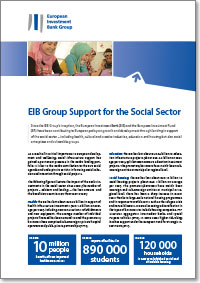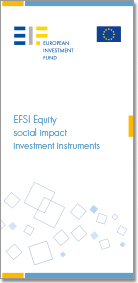- What we do
- Institutional investors
- Equity products
- AI Co-Investment Facility
- Cleantech Co-Investment Facility
- Impact investing at the EIF
- Climate & Infrastructure Funds
- Technology Transfer
- European Angels Fund (EAF) - Co-investments with Business Angels
- Venture capital
- The Social Impact Accelerator (SIA)
- Lower mid-market
- Mezzanine Facility for Growth
- VentureEU
- EFSI Equity instrument
- Single EU Equity Financial Instrument
- Private equity secondary market transactions
- EIF-NPI Equity Platform
- ESCALAR Programme
- Debt products
- New ESIF ERDF Guarantee Fund initiative in Greece
- EFSI Private Credit Programme
- AGRI Guarantee Facility
- AGRI Italy Platform Uncapped Guarantee Instrument
- Credit enhancement
- Cultural and Creative Sectors Guarantee Facility (CCS GF)
- ENSI - Securitisation Initiative
- Erasmus+ Master Loan Guarantee Facility
- Skills & Education Guarantee Pilot
- EREM debt products
- Single EU Debt Financial Instrument
- Documentary Finance Facility – Bulgaria
- The SME Initiative
- Inclusive finance
- European Fund for Strategic Investments (EFSI)
- Regional Development - Country and sector-specific initiatives
- Normandie Garantie Agri
- FAIRE - La Réunion
- Auvergne Rhône-Alpes FEADER
- Recovery Equity Fund of Funds of Bulgaria
- Fons d’Inversió en Tecnologia Avançada (FITA) Catalonia
- Dutch Future Fund (DFF)
- Dutch Alternative Credit Instrument (DACI)
- PORTUGAL BLUE: a new initiative for blue economy investments
- JEREMIE Greece Reflows – Business Angels’ Co-Investment Equity Instrument
- German Corona Matching Facility (CMF)
- Portugal Growth programme
- Central and Eastern European Technology Transfer (CEETT)
- Croatian Growth Investment Programme (CROGIP) II
- Croatian Growth Investment Programme (CROGIP)
- Croatian Venture Capital Initiative 2 (CVCi 2)
- AGRI Italy Platform Uncapped Guarantee Instrument
- DISPOSITIF INSTRUMENTS FINANCIERS BOURGOGNE FRANCHE-COMTÉ
- ALTER’NA – ESIF EARFD Nouvelle-Aquitaine
- Baltic Innovation Fund 1 (BIF 1)
- Baltic Innovation Fund 2 (BIF 2)
- Central Europe Fund of Funds (CEFoF)
- Croatian Venture Capital Initiative (CVCi FoF)
- Competitiveness Fund-of-Funds for SMEs in Romania
- The Cyprus Entrepreneurship Fund (CYPEF)
- Deep and Comprehensive Free Trade Area Initiative East Guarantee Facility (DCFTA)
- EU4Business Capped Guarantee
- Dutch Growth Co-Investment Programme
- Dutch Venture Initiative (DVI-II)
- ESIF Fund-of-Funds Greece
- EAFRD FoF Portugal
- EAFRD FoF Romania
- The ERP-EIF Facility
- ERP-EIF Co-Investment Growth Facility
- The LfA-EIF Facilities
- The German Future Fund (GFF) - EIF Growth Facility
- INAF – French National Agricultural Initiative
- ESIF Energy Efficiency and Renewable Energy Malta
- Regional Fund-of-Funds Romania
- ESIF Fund-of-Funds Czech Republic
- The Silesia EIF Fund of Funds
- La Financière Région Réunion
- The EIB Group Risk Enhancement Mandate (EREM)
- EstFund
- Call for Expression of Interest for FOSTER II
- Greater Anatolia Guarantee Facility (GAGF)
- G43 - Anatolian Venture Capital Fund Project
- InvestBG Equity Instrument
- JEREMIE
- Romania Recovery Equity Fund of Funds
- JEREMIE Romania Reflows – Equity Instrument
- Luxembourg Future Fund 1 (LFF)
- Luxembourg Future Fund 2
- Mezzanine 'Fund of Fund' for Germany (MDD)
- NEOTEC resources
- Polish Growth Fund of Funds (PGFF)
- Portugal Venture Capital Initiative (PVCi)
- Scottish-European Growth Co-Investment Programme
- Slovene Equity Growth Investment Programme (SEGIP)
- Swedish Venture Initiative (SVI)
- Turkish Growth and Innovation Fund (TGIF)
- Western Balkans Enterprise Development & Innovation Facility (WB EDIF)
- EAFRD FoF Greece
- Irish Innovation Seed Fund (IISF)
- RRF Czech Republic Fund of Funds
The Social Impact Accelerator (SIA)
The Social Impact Accelerator (SIA) is the first pan-European public-private partnership addressing the growing need for availability of equity finance to support social enterprises. SIA is a first step in the EIB Group’s (European Investment Bank and EIF) strategy to pioneer the impact investing space and respond to the wider EU policy aim of establishing a sustainable funding market for social entrepreneurship in Europe. This segment of the business world is becoming increasingly instrumental in promoting social inclusion, providing alternative sources of employment for marginalised social groups, and contributing to growth. These positive results underline the importance of SIA’s aim to build up the existing market infrastructure for social impact investing in such a way that this emerging asset class is placed on a path to long-term sustainability.
SIA reached its final closing in July 2015 at the size of EUR 243m, combining resources from the EIB Group and external investors, including Credit Cooperatif, Deutsche Bank as well as the Finnish group SITRA and the Bulgarian Development Bank(BDB).
What is SIA’s Investment Strategy?
SIA operates as a fund-of-funds managed by EIF and invests in social impact funds which strategically target social enterprises across Europe. In the context of the SIA, a social enterprise shall be a self-sustainable SME whose business model serves to achieve a social impact. It shall provide an entrepreneurial solution to a societal issue based on a scalable approach, and shall have a measurable impact. Read here more details about SIA's definition of social enterprise
To measure social impact, EIF has developed a new framework for quantifying and reporting on impact metrics at all levels of the SIA investment chain. Social impact funds financed by SIA are asked to define between 1 and 5 social impact indicators per portfolio company and set pre-investment quantifiable objectives for each of the indicators. Over time, EIF and its co-investors in a social impact fund will monitor portfolio companies’ progress towards achieving their social impact objectives. The fund manager will be held accountable for the social performance of its portfolio companies since this performance will partly affect the distribution of Carried Interest to the management team. Read here more details about SIA's social impact performance methodology
SIA will also ensure that knowledge-sharing between private sector actors committed to social impact investing and EIF becomes a core part of the initiative from the outset. To this end, Crédit Coopératif and Deutsche Bank have joined the EIB Group as founding investors and as part of an undertaking to pioneer strong public-private partnership in the sector. Social enterprises with the necessary support for developing their social business activity.
Are you a fund manager interested in partnering with EIF under SIA?
For SIA, EIF seeks to invest in social impact funds which:
-
in addition to financial return targets, also pursue explicit social impact investment targets at the level of their portfolio companies;
-
measure and report on social impact performance achieved at social enterprise level, in addition to financial return performance; and
-
follow strong environmental, social and governance standards in their own activities.
For this purpose, EIF, in its selection process seeks to identify suitable fund managers which:
-
address and achieve a measurable social and/or environmental impact by their investment into social enterprises;
-
measure and report satisfactorily on social impact achieved;
-
select commercially viable social enterprises; and
-
provide investee social enterprises with the necessary support for developing their social business activity.
EIF therefore seeks to identify qualified and credible partners with extensive experience in social impact financing. If you are interested in partnering with EIF as a fund manager under SIA, please provide detailed information on:
-
The investment strategy and a description of the social impact segment on which it is focused. This section should outline how the investment proposal fits with the current social impact investing market landscape, including the sector and stage targeted and the reasons for this focus;
-
The team, which should reflect the skill-set required to implement the investment strategy. This section should address how team members complement each other in terms of know-how and experience, and ideally demonstrate evidence of the team’s stability and proven ability to work together effectively. Emerging and/or first time teams would be also considered;
-
The track record, which should provide evidence of the team’s investment capabilities, including adequate experience in targeting social enterprises in the specific target geography;
-
The fund size and supporting evidence demonstrating its commercial viability and the stability of its investment capacity;
-
The fund’s legal and tax structure and other relevant terms and conditions; and
-
The alignment of interest between the stakeholders of the fund.
Please send your investment proposal covering all the information detailed above to: dealflow.inv@eif.org
According to the information provided, EIF’s Impact Investing team will decide on whether or not to initiate a due diligence process.
Read more about social entrepreneurship in articles authored by EIF staff:
"Le modèle rentable et équitable" in L'Agefi (June 2014) [PDF article]
"Impact Financing Performance Measurements in Fund Investments" in CFI.co magazine (Spring 2013)
- IMPACT partenaires launches EUR 50 million investment fund to create franchises in French urban deprived areas
- EFSI Equity instrument
- EIF launches a social impact investing fund of funds
- EIF secures the Bulgarian Bank of Development as additional investor for its Social Impact Accelerator Initiative
Investments under SIA
- Ananda Impact Fund III GmbH & Co. KG
- BonVenture III GmbH & Co. KG
- Bridges Social Impact Bond Fund LP
- Citizen Capital II
- Creas Impacto F.E.S.E., S.A.
- Den Sociale Kapitalfond Invest I K/S
- Future Positive Capital Fund
- Impact Creation 1
- Impact Croissance IV
- Impact Partenaires III
- Impact Ventures I
- Impact Ventures UK Sub-Fund
- Mustard Seed Maze Social Entrepreneurship Fund I, FES
- Oltre II SICAF EuVECA S.p.A.
- Phitrust Partenaires Europe SAS
- SIV NL Coöperative Social Impact Ventures NL Fund I U.A.
- Social Venture Fund II
Copyright ©
European Investment Fund – The European Investment Fund is not responsible for the content of external internet sites.






